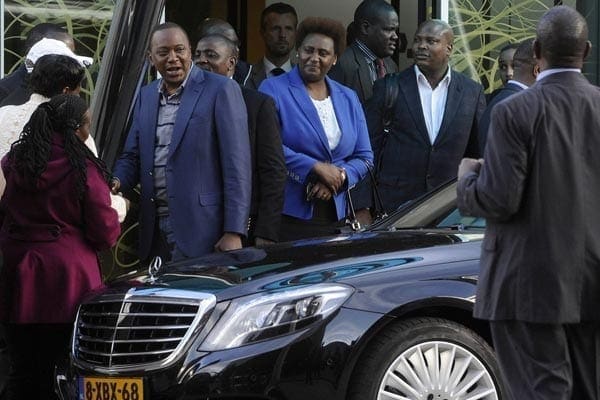
International Criminal Court’s chief prosecutor Fatou Bensouda says no special treatment will be accorded to President Uhuru Kenyatta and his deputy William Ruto when their trial hearings begin, and instead said the two will be treated like any other accused persons before the court.
On their part, joint defence lead counsels Karim Khan and Katwa Kigen demanded a fair process that they believe will prove to the ICC and the world who was not responsible for the 2007 post election violence.
The three were addressing a joint news conferencebefore the trial hearings kick off Tuesday.
ICC Drops Case Against Kenyan President
NAIROBI — The International Criminal Court prosecutor withdrew crimes against humanity charges against Kenyan President Uhuru Kenyatta, citing a lack of evidence. Accusations that the government did not cooperate with the court during its investigation also influenced the decision to drop the case Friday.
ICC lead prosecutor Fatou Bensouda said there was not enough evidence to prove the charges against Kenyatta beyond a reasonable doubt.
Bensouda said Kenya’s government failed to provide key documents to the prosecution, which undermined her investigations and “had a severe, adverse impact” on the case. She also said she reserved the right to file charges again if more evidence becomes available.
Kenyatta was charged for his alleged role, before he was president, in the inter-ethnic violence that followed the 2007 Kenyan elections, leaving 1,100 people dead and displacing more than 500,000 others.
Deputy still faces charges
His deputy, William Ruto, still faces charges at the ICC for similar crimes.
In a message on his official presidential Twitter account, Kenyatta said he was “excited” by the news his case was being withdrawn, adding in a separate message “my conscience is absolutely clear.”
His lawyer, Steven Kay, told reporters the ICC owes the president an apology for bringing a case based on what he said was false evidence.
Kenya’s Attorney General Githu Muigai said the government had done its best to produce material requested by the prosecution, but some of the demands were impossible to meet.
Decision criticized
U.S.-based Human Rights Watch criticized the court’s decision, saying it “sets back efforts to end the country’s entrenched culture of impunity.” The nonprofit research and advocacy group said the roadblocks in the Kenyatta trial make it all the more important for the ICC to figure out how it can move ahead with high-profile cases against powerful people.
Apollo Mboya, chief executive of the Law Society of Kenya Apollo, said he was not surprised to see the case fall apart.
“Of course, it’s the quality of evidence. It’s pure and simple,” he said. “And the prosecutor said it: She didn’t have evidence, so what did they investigate? It failed on that score.”
Charges against Kenyatta were filed in January 2012, but the case began to unravel as witnesses started backing away from their testimony or refused to participate.
Following a request to further postpone the proceedings, judges on Wednesday gave the prosecution seven days to either withdraw the case or go to trial.
European Council on Foreign Relations rights specialist Anthony Dworkin believes the Kenyatta case offers a lesson.
“It doesn’t in any way indicate that the court should not go after political leaders. It just depends on the evidence in the case,” Dworkin said. “The lesson is that the court has to move very carefully, particularly in these sensitive cases, to make sure it has a solid base of evidence to pursue the charges it wants to pursue.”
Victims dissatisfied
Victims of the post-election violence still feel they have not received justice.
Keffa Karuoya, who works with a group for those displaced by the fighting, estimates some 44,000 people are still living in camps. Many already had lost faith in the ICC process before Friday’s announcement, he said.
“Their hopes have seriously faded,” Karuoya said. “Talking to several victims, they could not see the credibility of the case.”
Kenyatta and his deputy, Ruto, were accused of being on opposite sides of the ethnic fighting. But they banded together ahead of last year’s presidential elections, issuing a joint call to reject the ICC as part of their campaign.
The African Union has also backed Kenya’s calls for the ICC to drop the charges, and has accused the court of unfairly targeting Africans.
In October, Kenyatta became the first sitting president to appear before the ICC, attending a key hearing meant to determine whether the case against him should be dropped or postponed indefinitely.
The Kenyatta case was a major test for the Hague-based court, which has secured only two convictions and closed a total of three cases since it began operating in 2002. If the trial had gone forward, Kenyatta would have become the first current head of state to undergo prosecution there.
Source-https://www.voanews.com/







